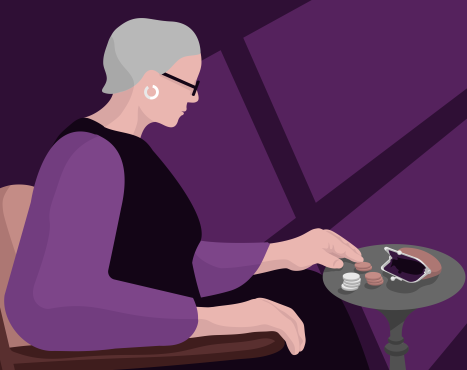Older Londoners Poverty

Published on 16 November 2023 01:38 PM
We recently launched our latest report about poverty and the current situation for older Londoners. This is the second of what will become an annual series looking at the topic. John McGeachy, our Campaigns Manager, writes about poverty and what steps can be taken to make life better for London’s older people.
Poverty amongst older Londoner - its causes and how can we fight it?
There are many ways that someone can experience poverty. The choice between ‘heating or eating’ is something we hear about often, but poverty can be so many things. It could be not replacing a worn-out winter coat or not getting a haircut, to facing the fear of a rent payment you’ll struggle to make.
The older Londoners interviewed for Age UK London’s latest ‘Poverty amongst older Londoners’ report told us about waiting until 6pm to turn the heating on, not using lights and skipping meals.
The report doesn’t set out to go into lots of detail about the underlying reasons behind poverty amongst older Londoners. Instead, it seeks to outline key data, primarily based on the most recent edition of the Department for Work and Pensions’ ‘Households Below Average Income statistics. We published the report to increase both awareness and understanding of the current situation.
First, the data shows us 24% of Londoners over 50 (and 23% of those aged 66 and over (pensioners)) live in poverty. Like most other organisations, we use the common definition of poverty, which is when income is less than 60% of the current median income.
The poverty rate of 24% is a 1% drop since last year’s data, but overall, we have witnessed a steep increase in poverty amongst older Londoners over the past decade.
We also see that older Londoners are more likely to live in poverty compared with their peers in other parts of the country. The 5% difference between poverty levels in London (24%) and the rest of England (19%) may not seem like a huge amount but it is in fact a significant gap. To put it into perspective, if poverty among older Londoners was at 19%, as it is across England, it would be the equivalent of 125,000 fewer older Londoners living in poverty. That’s a similar population to many ‘small’ cities.
There are several reasons why London has higher levels of poverty amongst the over 50s than the rest of the country. Firstly, renters are more likely than those in other housing tenures to live below the poverty line and London has a higher proportion of older renters (both social tenants and private renters) compared with the rest of the country. 28% of older private renters in London live in poverty and the situation for older social tenants is even worse – a shocking 46%.
Secondly, London had a higher proportion of older people from groups that traditionally experience higher rates of poverty due to factors based around a range of structural inequalities such older Black, Asian, or other minority ethnic older Londoners and LGBTQ+ older Londoners.
Thirdly, London had a high proportion of older people that live alone (nearly half of all older Londoners over 75 live alone) and the data shows that single pensioners in London (30%) are much more likely to live in poverty compared to pensioner couples (18%).
There are other reasons why London has higher poverty rates. Chiefly applicable for all ages, is the fact that London has by far the highest housing costs in the country. Some of the other factors are specific to older Londoners. An example of this is that while Pension Credit can help lift pensioners out of poverty, up to four in ten Londoners eligible for Pension Credit do not receive it.
In our report, we made several recommendations for the Mayor and London’s boroughs.
They include:
- Local authorities should review the effectiveness of current approaches to increase levels of Pension Credit uptake in their borough and the Mayor should continue his successful campaign to encourage uptake.
- Where the local authority has a strategy aimed at reducing poverty, they should audit the specific actions listed for their impact on older residents.
- Take steps to ensure that external organisations and communities working with or led by older residents are included in the design of interventions and in local anti-poverty partnerships. This should include participation in anti-poverty forums, and relevant steering groups.
- Take steps to enable older residents with lived experience of poverty to fully participate in poverty reduction strategies.
- To reduce fuel poverty and its impacts, local authorities should take steps to improve the energy efficiency of social housing stock.
The rising cost of living has influenced the fact that older people remain in poverty and face everyday challenges and, as winter approaches, the situation can only get worse. Now is the time for decision-makers across London to focus on their strategies to deal with poverty and work closely with organisations such as Age UK on a local level to deliver solutions.
John McGeachy is Campaigns Manager at Age UK London.

